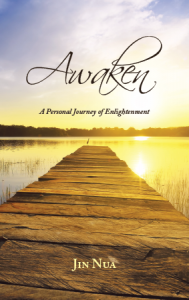 Many books exist on enlightenment yet none have been able to translate its experience in terms most can understand or relate to. After all—what is enlightenment? How does it feel? How does it happen? What changes? What are the benefits? How does one cope with its radical changes in cognition?
Many books exist on enlightenment yet none have been able to translate its experience in terms most can understand or relate to. After all—what is enlightenment? How does it feel? How does it happen? What changes? What are the benefits? How does one cope with its radical changes in cognition?
Enter Awaken.
In Awaken author Jin Nua describes his personal journey of enlightenment in the most intimate and tangible means possible.
A beautiful adventure beginning in Yellowstone National Park and ending in Thailand where Jin experienced a profound spiritual transformation in which his vision sharpened, his creativity exploded, and his mind was figuratively ‘set free’. Describing his transformation as the “holy grail of human experience –the universe’s greatest gift”; Jin outlines his journey and the methods readers might use to attain higher planes of being.
Not only Jin provides a host of practical advice and anecdotes on how to uplift and enhance one’s life. This treasure is jam packed with hosts of golden nuggets to elevate one’s life to the enchanted—if not the divine.
Presented in a drive by, easy to follow, billboard like format; readers are sure to learn great insights and possibly even jump into their own awakening experience.
Check out this delightful VDO Book Trailer of Awaken! You can purchase a copy here to begin your journey.
Also check out the following Awaken Book Review.
In our reactionary world of instant media and hyper-partisan politics, it’s refreshing to come across a quiet and concise meditation on life. In his gnomic new book, Awaken: A Personal Journey of Enlightenment, spiritual writer Jin Nua encourages readers to turn off their TVs, empty their minds, and reconnect with the quiet and peaceful center of existence.
Hailing from Thailand, Nua purveys a modern-day Buddhism based around his own spiritual journey of breaking societal preconceptions and rediscovering the pure core of consciousness at the center of his being, which he likens to the innocent and joyful mind-set of a child. Twenty-five chapters of short and crisp journal-like entries intertwine Nua’s personal journey with general admonishments on how to begin and sustain one’s own journey. Nua references not only his previous books and other Buddhist texts but also Dacher Keltner’s Born to be Good: The Science of a Meaningful Life.
While this leanness of style makes the salient points crystal clear, it leaves several of the chapters thin and lacking in depth. In the beginning, for instance, Nua mentions “various personal struggles” as an impetus toward his spiritual path, but besides a sentence or two about a career change in his life, the book doesn’t provide enough personal details to connect readers with the emotional context of his transformation. Furthermore, meditation is repeatedly recommended, but few specifics about which meditations to practice are offered. The closest we get is a brief chapter on koan paradoxes that lacks any specific example.
On the other hand, Nua inspires when he addresses nature and metaphysics. A passage about getting close to the source of creation is especially beautiful as the author waxes poetic about “the brilliant radiance of flowers, rainbows and sunsets, a sparkling glacier, temples, and infinite stars on a moonless night.” In contrast to his more poetic side, Nua is surprisingly analytic and incisive when addressing the relationship between self and the universe. Society, he argues, trains us to seek advantage and protect our inflated social status. “Awakening” demands we accept and love the “here and now” of reality, “simply by allowing all things to flow as closely as possible to how they naturally are.”
Awaken is not a comprehensive religious text on enlightenment and doesn’t purport to be. It functions mainly as a short, easy-to-read, and is an enjoyable refresher on Buddhist principles and the mindful life. It will come in handy for those readers interested in extracting “beauty from the heart of all things—one small yet immense encounter at a time.” –Clarion Reviews